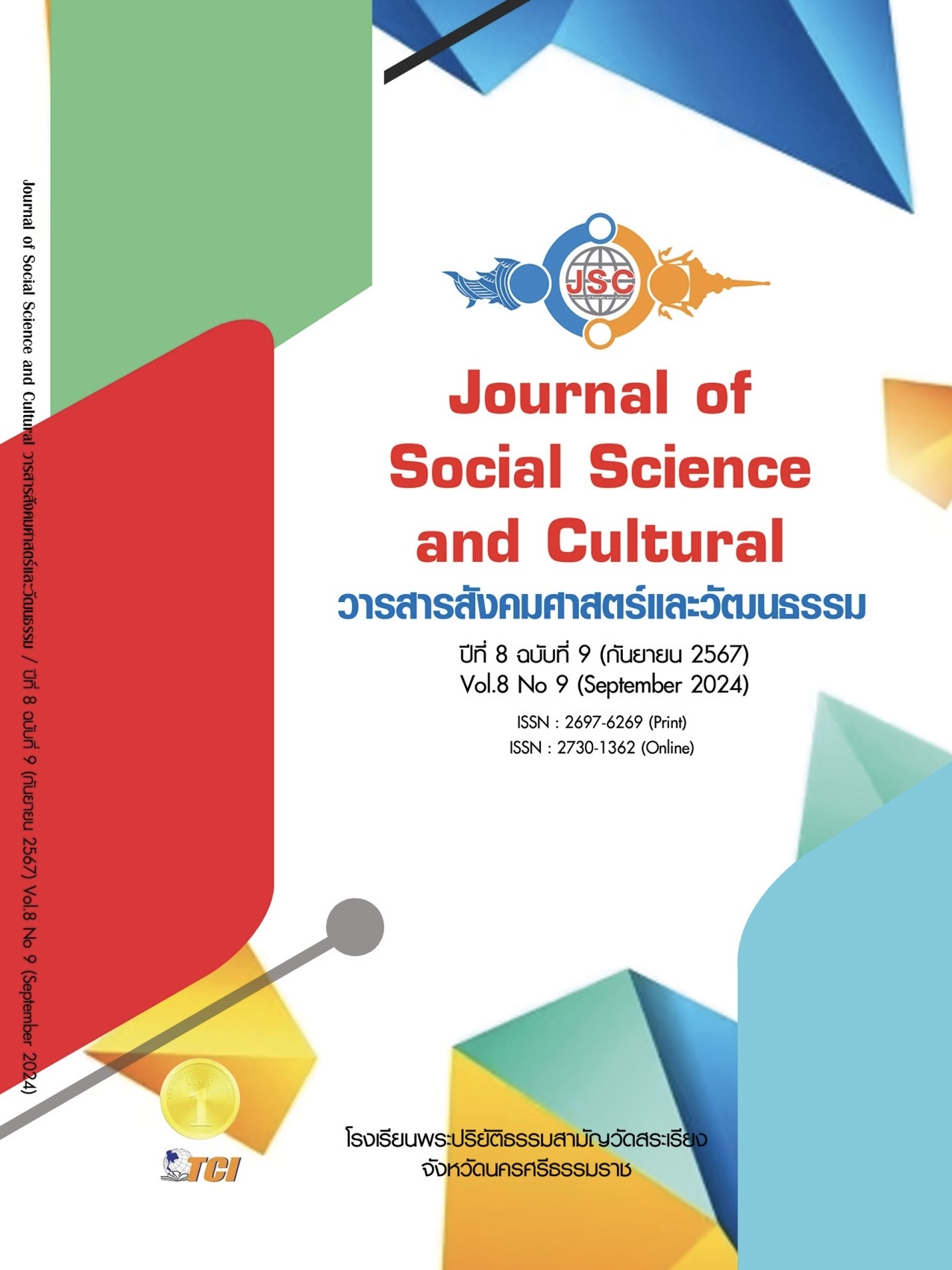THE DEVELOPMENT OF SHORT-TERM TRAINING CURRICULUM SETS TO ENHANCE PSYCHOLOGICAL SKILLS: A CASE STUDY OF KRURAKTIN SCHOLARSHIP AT MUBAN CHOMBUENG RAJABHAT UNIVERSITY
Main Article Content
Abstract
This research aimed to: 1) Study the problems and needs in developing short-term training curriculum sets to enhance psychological skills for KRURAKTIN (Local Teacher Development) scholarship students, 2) Develop and evaluate the efficiency of the short-term training curriculum sets, and 3) Implement and assess the effectiveness of the short-term training curriculum sets. The research was a multi-phase mixed method research, conducted in two phases: Phase 1 involved studying the problems and needs, and developing and evaluating the efficiency of the short-term training curriculum sets. This phase employed qualitative research methods, utilizing focus group discussions with a sample of 12 KRURAKTIN scholarship students. and Phase 2 focused on implementing and assessing the effectiveness of the short-term training curriculum sets, which were divided into four curricula based on academic year levels. The sample consisted of 115 KRURAKTIN scholarship students. The research findings were as follows: 1) KRURAKTIN scholarship students demonstrated a necessity for enhancement in psychological skills through four curricula: self-awareness skill training, application of positive psychology in daily life, stress management and cognitive-behavioural adjustment techniques, and willpower enhancement. 2) Each training curriculum comprised principles and rationale, objectives, content, structure, activities, and media. The evaluation results indicated that the short-term training curriculum sets were highly effective. and 3) The implementation of the short-term training curriculum sets revealed that for all four curricula, students who participated in the training demonstrated a statistically significant increase in knowledge aligned with the training objectives at the 0.01 level. Furthermore, the students expressed a high level of satisfaction with the training curricula.
Article Details
References
กษิดิ์เดช คำพุช. (2566). ปัญหาการขาดแคลนครูในโรงเรียนขนาดเล็ก: สาเหตุ แนวทางแก้ไข และบทบาทของภาคีเครือข่าย. วารสารการศึกษา มหาวิทยาลัยราชภัฏอุบลราชธานี, 25(2), 1-1.
ชาย โพธิสิตา. (2564). ศาสตร์และศิลป์การวิจัยเชิงคุณภาพ. (พิมพ์ครั้งที่ 9). กรุงเทพมหานคร: อมรินทร์ปรินติ้งแอนด์พับลิซซิ่ง.
นพกุล ปุคลิต และทวีศิลป์ กุลนภาดล. (2565). การเปรียบเทียบสาเหตุและผลกระทบจากการย้ายของข้าราชการครู สังกัดสำนักงานเขตพื้นที่การศึกษามัธยมศึกษานครราชสีมา. วารสารบริหารการศึกษา มศว, 19(36), 1-12.
มารุต พัฒผล. (2567). การประเมินหลักสูตรเพื่อการเรียนรู้และพัฒนา (ฉบับขยายรายละเอียดจากประสบการณ์ปฏิบัติและการวิจัย). (พิมพ์ครั้งที่ 5). กรุงเทพมหานคร: จรัลสนิทวงศ์การพิมพ์.
Amati, V. et al. (2018). Social relations and life satisfaction: the role of friends. Genus, 74(7),1-18.
Auerbach, R. P. et al. (2018). WHO World Mental Health Surveys International College StudentProject: Prevalence and distribution of mental disorders. Journal of Abnormal Psychology, 127(7), 623-638.
Beiter, R. et al. (2015). The prevalence and correlates of depression, anxiety, and stress in a sample of college students. Journal of Affective Disorders, 173, 90-96. doi: 10.1016/j.jad.2014.10.054.
Biasi, V. et al. (2018). Homesickness experience, distress and sleep quality of first-year university students dealing with academic environment. Journal of Educational and Social Research, 8(1), 9-17.
Bruffaerts, R. et al. (2018). Mental health problems in college freshmen: Prevalence and academic functioning. Journal of Affective Disorders, 225, 97-103. doi: 10.1016/j.jad.2017.07.044.
Duckworth, A. L. et al. (2019). Beyond willpower: Strategies for reducing failures of self-control. Psychological Science in the Public Interest, 20(3), 97-137.
Eurich, T. (2018). What self-awareness really is (and how to cultivate it). Harvard Business Review, 96(1), 2-8.
Fredrickson, B. L. et al. (2017). Open hearts build lives: Positive emotions, induced through loving-kindness meditation, build consequential personal resources. Journal of Personality and Social Psychology, 113(6), 917-933.
Gidi, N. W. et al. (2021). Prevalence of low self-esteem and mental distress among undergraduate medical students in Jimma University: a cross-sectional study. Ethiopian Journal of Health Sciences, 31(3), 573-580.
Hofmann, S. G. et al. (2017). The efficacy of cognitive behavioral therapy: A review of meta-analyses. Cognitive Therapy and Research, 41(1), 1-14.
Nguyen, D. T. & Wright, E. P. (2019). Low self-esteem and its association with anxiety,depression, and suicidal ideation in Vietnamese secondary school students: a cross-sectional study. Frontiers in psychiatry, 10(1), 1-7.
Palai, P. K. & Kumar, P. (2016). Relationship among stress, adjustment and homesickness in university students. International Journal for Innovative Research in Multidisciplinary Field, 2(6), 101-106.
Taba, H. (1962). Curriculum development: theory and practice. New York: Harcourt, Brace & World.
Tyler, R. W. (1950). Basic principles of curriculum and instruction, syllabus for education 360. Chicago: University of Chicago Press.


